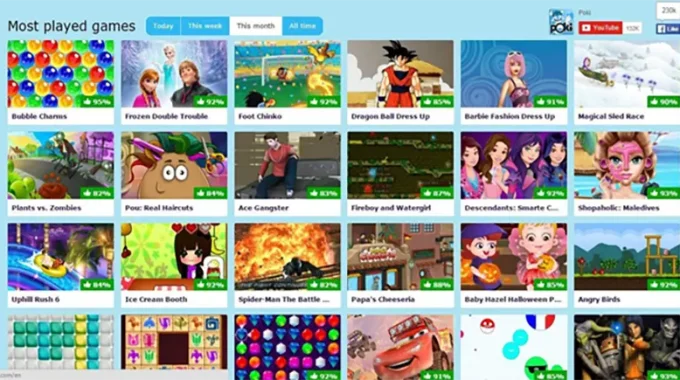In today’s digital age, the landscape of education is evolving rapidly. Educational online games have emerged as powerful tools that combine fun and learning. These engaging platforms transform mundane study sessions into exciting adventures, making it easier for children to grasp new concepts. The importance of these games cannot be overstated; they provide a unique way for kids to interact with educational content while enjoying the process.
Learning through play is not only effective but also essential in nurturing curiosity and creativity among young minds. When educational activities are infused with elements of fun, children become more motivated and willing to explore challenging topics. This natural enthusiasm fosters deeper understanding and retention of knowledge. In this article, we’ll dive into five standout online games that make learning easy and enjoyable. Get ready to discover how these innovative tools can spark joy in your child’s educational journey!
Game 1: 1v1 lol unblocked 76
1v1 lol unblocked 76 is a captivating online game that blends action with strategic thinking, making it one of the best games for kids looking to sharpen their skills while having fun. The multiplayer platform allows players to engage in real-time battles where they can build structures and eliminate opponents using a diverse range of weapons. This interactive learning tool isn’t just about combat; it encourages critical thinking, hand-eye coordination, and quick decision-making—all essential skills in educational growth.
What sets 1v1 lol apart from other educational online games is its engaging gameplay coupled with customizable features. Players have the option to create their own rooms or join existing ones, fostering a sense of community among young gamers. The colorful graphics and responsive controls make it appealing for children aged eight years and up, who thrive on the mix of competition and creativity this game offers. Educators appreciate its potential for teaching teamwork and sportsmanship as friends or classmates discuss strategies during gameplay.
Testimonials from both parents and teachers highlight how children have not only improved their gaming skills but have also enhanced their cognitive abilities through interactions in 1v1 lol. Many report increased focus when playing as well as improved problem-solving skills in academic subjects after regular engagement with the game. One parent noted their child’s confidence blossomed once they began winning matches against peers, which translated into better participation in classroom discussions.
Overall, 1v1 lol unblocked 76 stands out due to its unique blend of entertainment and education. As an interactive learning tool, it paves the way for children to develop valuable life skills while enjoying themselves. It’s clear that as playful environments evolve through technology, games like this offer both laughter and meaningful lessons—making them indispensable resources in today’s digital education landscape.
Game 2: Prodigy Math Game
Prodigy Math Game has emerged as one of the most engaging digital education resources available today. This interactive math game combines elements of adventure and role-playing, allowing children to solve math problems while exploring a fantasy world. As they level up through various challenges, players encounter mathematical concepts ranging from basic arithmetic to advanced algebra, making it suitable for students in grades 1-8. The game’s seamless integration of gameplay with curriculum-aligned exercises ensures that learning objectives are met while students remain entertained.
What sets Prodigy apart is its adaptive learning technology, which personalizes the experience for each player based on their skill level. This means that whether a child excels in multiplication or needs extra help with fractions, the game tailors questions accordingly, promoting mastery rather than rote memorization. Educators can also use this feature to track progress through comprehensive reports that detail each student’s strengths and areas needing improvement—a valuable tool for both parents and teachers utilizing online learning platforms.
Furthermore, the vibrant graphics and captivating animations capture children’s attention effectively. As players journey through magical realms, they’ll encounter whimsical characters and enchanting landscapes that enhance engagement, encouraging longer play sessions dedicated to learning. These visual elements not only keep kids immersed but actively stimulate interest in math by transforming traditionally tedious subjects into dynamically designed environments.
Overall, Prodigy Math Game exemplifies how educational games can merge amusement with instruction seamlessly. It provides a wealth of knowledge while ensuring motivation stays high, making it an indispensable resource for enhancing foundational math skills in a fun-filled way. With its strategic blend of gameplay mechanics, personalization features, and captivating visuals, this game proves to be a remarkable addition to any digital education resource toolkit aimed at fostering academic growth among young learners.
Game 3: Cookie Clicker 2
Cookie Clicker 2 is a delightful mix of casual gaming and educational value, making it an excellent choice among interactive online games. The core mechanics revolve around clicking to generate cookies, which players can then use to buy upgrades, unlock new features, and automate cookie production. This simple yet engaging gameplay encourages strategic thinking and decision-making as players figure out the most effective way to progress and maximize their cookie output. Additionally, the game incorporates elements of resource management, subtly introducing concepts that are vital in fields like economics and computer science.
One of the standout aspects of Cookie Clicker 2 is its age appropriateness; it appeals to a wide range of learners—from young children beginning to grasp basic math skills to older students looking for a fun way to strengthen their strategic thinking abilities. Its adaptable nature means that parents can customize gameplay experiences based on their child’s learning level. By adjusting how much time they spend playing and encouraging discussions about strategy or math involved in purchasing upgrades, parents can ensure that kids are not just having fun but also absorbing pertinent skills through play.
Educators have also noted Cookie Clicker 2’s effectiveness in stimulating interest in STEM subjects among students. Many teachers report incorporating this game into their lesson plans as a reward or an interactive learning tool. For example, after completing a math unit on multiplication or fractions, teachers employ Cookie Clicker 2 Unblocked as a way to illustrate the concept of exponential growth while keeping engagement high. Feedback from these educators highlights that when students see tangible results from their strategies—such as raising their cookie output—they become more invested in understanding the underlying mathematics.
In conclusion, Cookie Clicker 2 exemplifies how skill-building games can successfully blend entertainment with educational objectives. The robust interactive mechanics not only keep children engaged but encourage them to think critically about resources and efficiency simultaneously—the perfect recipe for rich learning experiences packed into a charming package!
Game 4: Word Quest
Word Quest stands out in the realm of language learning games as it seamlessly integrates fun and education, making vocabulary expansion a thrilling endeavor for kids. With vibrant graphics and engaging storylines, players embark on adventurous quests where they must solve word puzzles to unlock treasures and overcome obstacles. This game is designed to enhance literacy skills through interactive gameplay, providing an immersive experience that goes beyond rote memorization.
One of the most captivating features of Word Quest is its variety of challenges tailored to different age groups. For example, preschoolers can dive into color-matching puzzles that associate letters with imagery, while older children might tackle crossword challenges that encourage critical thinking and context clues. Each level introduces new words in thematic contexts—like animals or food—ensuring players practical exposure across multiple scenarios. Feedback from educators highlights how these stimulating challenges not only capture children’s attention but also promote cognitive development by enhancing their problem-solving abilities.
Word Quest has been recognized in various edtech awards for its innovative approach to early language acquisition, even receiving accolades such as “Best Preschool Education Game” at the EdTech Awards. This recognition underscores the game’s effectiveness at fostering a love for language learning while sharpening essential skills like spelling, reading comprehension, and logical reasoning. Many teachers also praise its adaptability in classroom settings, noting how it fits seamlessly into lesson plans or serves as a delightful supplement for English Language Learners.
Overall, Word Quest exemplifies how educational games can transform traditional learning methods into enjoyable experiences. By blending play with purpose-driven activities, it nurtures not just knowledge retention but also creativity and engagement among young learners—evidence that when education is made entertaining, both students and educators reap significant rewards.
Game 5: Low’s Adventure 2
Low’s Adventure 2 is a delightful blend of fun and learning, making it one of the standout educational online games available today. One of its most attractive features is its collaborative multiplayer mode, where players can team up with friends or classmates to embark on exciting quests. This cooperative gameplay not only makes the experience more enjoyable but also encourages communication and teamwork skills among players. Children learn to strategize and solve problems together, thereby deepening their social skills while immersing in an engaging narrative.
In terms of balancing entertainment with educational objectives, Lows Adventure 2 shines brightly. The game integrates various subjects like math, science, and language arts into its puzzles and tasks, turning routine learning into an adventure. For instance, players might need to solve mathematical equations to unlock new levels or gather resources by answering trivia questions related to scientific concepts. This seamless integration ensures that children are prepared not only for academic challenges but also develop critical thinking skills—all while having a blast in a rich gaming world.
Educators have noted the effectiveness of using Low’s Adventure 2 as a teaching tool in classrooms. Many have shared successful experiences implementing this game as part of their lessons, allowing students to engage directly with content they might find tedious through traditional methods. By framing education within an interactive scenario, teachers observed improved retention rates and heightened enthusiasm towards subject matter. They suggest using the game as a reward after completing specific lessons or creating class competitions based on scores achieved in-game – both methods foster motivation while driving home key learning outcomes.
Implementing Low’s Adventure 2 within educational settings holds promising potential for reshaping how students perceive learning through gaming. It exemplifies how innovative design can make educational online games engaging without sacrificing essential skill development—encouraging kids to explore knowledge eagerly rather than viewing it as a chore.
Benefits of Educational Online Games
Educational online games offer numerous advantages that can enhance learning and engagement for children both at home and in school. One of the most significant benefits is their ability to reinforce core subjects such as math, science, and reading through interactive gameplay. For example, a game designed around solving math puzzles may allow students to practice addition and subtraction while navigating exciting challenges. This enjoyable approach not only makes learning less intimidating but also encourages kids to persist through difficult problems, turning potential frustration into fun.
Another crucial advantage is the role of engagement in skill retention among children. Studies have shown that when children are actively involved in their learning process—especially through enjoyable means such as gaming—they tend to retain information more effectively. Educational games often utilize rewards systems and levels which provide immediate feedback on progress; this leads to a sense of achievement that positively reinforces the learning experience. When children see their skills improve or earn badges for accomplishments, they are more likely to remain motivated and curious about further exploration.
Tips for Parents and Educators
When selecting educational online games for children, parents and educators should consider several key factors tailored to age and interest levels. To start, it’s important to choose games that align with each child’s developmental stage; younger learners may benefit from simple, colorful games that focus on foundational skills like counting or letter recognition, while older students might find strategic puzzle or role-playing games more engaging as they delve deeper into complex topics. Additionally, always keep an eye out for subject variety—ensuring there’s exposure across different disciplines can stimulate broader cognitive growth.
Integrating gaming into educational routines effectively requires thoughtful scheduling. As an example, educators might set aside designated time each week where technology use focuses solely on academic-related gaming activities within the classroom setting. Parents can establish similar practices at home by designating “game nights” dedicated to educational playfully challenging each other with trivia or problem-solving games. This structure not only maximizes the benefits derived from these resources but ensures that screen time remains balanced with other forms of learning and social interaction.
Resources for Further Learning
As the world of educational online games continues to expand, finding reliable platforms to supplement children’s learning can be a daunting task. Fortunately, there are several fantastic resources out there that cater specifically to blending fun and education. Websites such as **Khan Academy** offer game-like exercises across various subjects, from math and science to arts and history. Their interactive quizzes and challenges not only make learning enjoyable but also track progress over time, ensuring that children develop a solid understanding of concepts at their own pace.
Another wonderful platform is **PBS Kids**, which houses an extensive array of games focused primarily on foundational skills for younger learners. With characters from popular PBS shows leading the charge, children are immersed in content that feels entertaining while still being deeply educational. Parents will appreciate how these games align with curriculum standards, providing confidence that their children are receiving quality educational experiences during playtime.
For parents and educators seeking insights into gamified learning techniques, several books stand out in this field. “The Art of Game Design: A Book of Lenses” by Jesse Schell provides valuable perspectives on the principles behind effective game design—insights that can be applied toward crafting engaging educational experiences. Additionally, “Reality Is Broken: Why Games Make Us Better and How They Can Change the World” by Jane McGonigal offers compelling arguments about how gaming can enhance our capabilities outside conventional settings—arguing strongly for its role in education.
Lastly, online communities such as **Edutopia** feature numerous articles discussing innovations in gamification within classrooms. These resources provide not only examples of successful implementations but also guidance on best practices when integrating educational online games into lesson plans or at-home activities. By tapping into these platforms and literature, both parents and educators can cultivate a richer learning environment that harnesses the power of play in developing essential skills.
Embracing Fun in Learning
In today’s fast-paced digital world, educational online games have emerged as powerful tools for enhancing children’s learning experiences. These games not only make learning enjoyable but also encourage critical thinking and problem-solving skills. By integrating fun into the educational process, they keep kids engaged and motivated, making knowledge retention easier.
We encourage parents and educators to explore these top five games and consider how they can be incorporated into everyday routines. Embracing fun through gaming can lead to more effective learning outcomes, fostering a love for knowledge that lasts a lifetime. Let’s support our children on their educational journeys by tapping into the transformative power of play!











